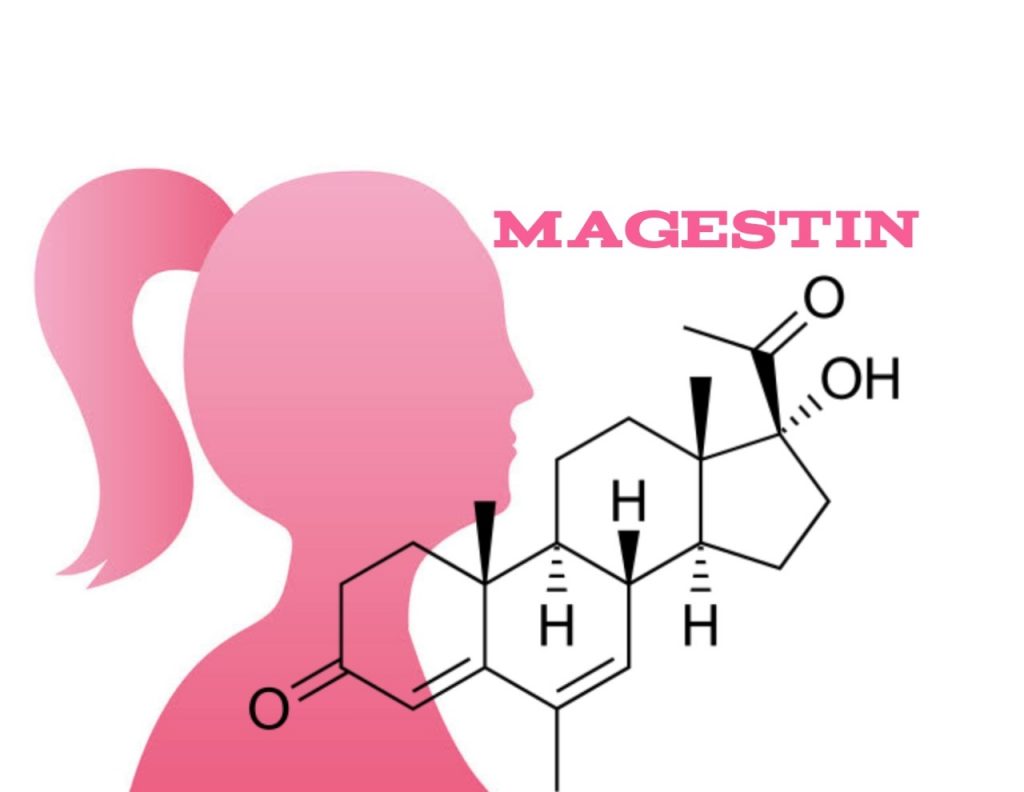Magestin: Uses, Benefits, Dosage, Side Effects, Interactions

What is Magestin?
Magestin is a synthetic progestin that mimics the body’s naturally-occurring hormone progesterone. Magestin is formulated to interact with progesterone receptors in the body in order to cause progesterone-like effects. This means that they do some of what the body’s natural progesterone does.
Magestin works by triggering changes in the uterus. After the amount of this Magestin in the blood drop, the lining of the uterus begins to come off and vaginal bleeding occurs (menstrual period). Magestin works with other hormones to start and stop the menstrual cycle.
Magestin is used in the treatment of the following conditions :
• Abnormal uterine bleeding
• Acne
• Amenorrhea, or absence of menstruation
• Anticancer hormonal therapy
• Birth control
• Breast pain
• Breast, kidney, or uterine cancer
• Breastmilk production
• Changes in hair growth
• Changes in sexual desire
• Endometrial hyperplasia, an abnormal thickening of the uterus wall
• Endometriosis
• Hormone replacement therapy
• Infertility treatment, when used as a cream
• Menstrual disorders
• Preventing premature birth
Magestin Dosage
Take Magestin only as directed by your doctor. Do not take more of it and do not take it for a longer time than your doctor ordered. To do so may increase the chance of side effects. Try to take the medicine at the same time each day to reduce the possibility of side effects and to allow it to work better.
The number of Magestin doses you take each day, the time allowed between doses, and the length of time you take the medicine depend on the medical problem for which you are using the medicine.
Magestin is often given together with other medicines. If you are using a combination of medicines, make sure that you take each one at the proper time and do not mix them. Ask your health care professional to help you plan a way to remember to take your medicines at the right times.

Is Magestin safe?
While the target of Magestin in hormone therapy is generally the uterus, Magestin therapy affects every major organ system including the brain, the cardiovascular system, the immune system and the generation of blood cells. As in other systems, progestins have unique effects on the brain which ultimately could impact the long-term neurological health of users. Most of the effects of Magestin on the brain are beneficial, although some research has shown that they may pose some risks.
Studies have shown that synthetic progestins like Magestin when added to estrogen in hormone replacement therapy (HRT), increased the risk of breast cancer much more than estrogen alone.
Magestin side effects
Side effects of Magestin use may include:
• Breast tenderness or pain
• Changes in appetite
• Excessive worrying
• Fluid retention
• Headaches
• Mood swings and irritability
• Muscle, joint, or bone pain
• Problems urinating
• Runny nose, sneezing, and cough
• Tiredness
• Upset stomach, vomiting, diarrhea, and constipation
• Vaginal discharge
• Weight gain
Uncommon but potentially serious side effects requiring medical attention include:
• Absence of coordination
• Breast lumps
• Breathlessness
• Bulging eyes
• Clay-colored stools
• Clear or bloody discharge from the nipple
• Coughing up blood
• Crusting or scaling of the nipple
• Depression
• Difficulty swallowing
• Dimpling of breast skin
• Double vision
• Hives, skin rash, and itching
• Hoarseness
• Inverted nipple
• Leg swelling
• Loss of or blurred vision
• Migraine headache
• Pounding heartbeat
• Seizures
• Severe dizziness
• Sharp chest pain
• Slow speech or difficulty speaking
• Stomach pain or swelling
• Swelling of the face, throat, tongue, lips, eyes, hands, feet, ankles, or lower legs
• Uncontrollable shaking hands
• Unexpected vaginal bleeding
• Weakness or numbness of limbs
Magestin is not suitable for people with a history of the following conditions unless they are using it to treat the condition:
• Acute porphyrias
• Breast cancer
• Genital cancer
• Idiopathic jaundice
• Liver tumors
• Pemphigoid occurring during pregnancy
• Severe arterial disease
• Severe pruritus occurring during pregnancy
• Undiagnosed vaginal bleeding
Does Magestin interact with other drugs?
Serious interactions of Magestin include:
• bosutinib
• fedratinib
• idelalisib
• ivosidenib
• pomalidomide
Moderate interactions of Magestin include:
• avapritinib
• axitinib
• betrixaban
• cenobamate
• dabrafenib
• elvitegravir/cobicistat/emtricitabine/tenofovir DF
• fedratinib
• glecaprevir/pibrentasvir
• iloperidone
• istradefylline
• letermovir
• lomitapide
• metformin
• mitotane
• stiripentol
• tazemetostat
• tecovirimat
• tinidazole
• vismodegib
Mild interactions with Magestin include:
• bazedoxifene or conjugated estrogens
• conjugated estrogens
• conjugated estrogens, vaginal
• doxorubicin
• doxorubicin liposomal
• ruxolitinib
This document does not contain all possible interactions with Magestin. Therefore, before using this product, tell your doctor or pharmacist of all the products you use. Keep a list of all your medications with you, and share the list with your doctor and pharmacist. Check with your physician if you have health questions or concerns.





